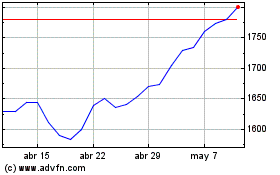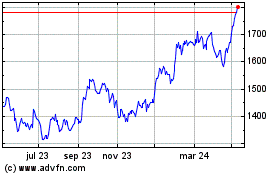TIDMGSK
RNS Number : 8036A
GlaxoSmithKline PLC
14 September 2018
14 September 2018, London, UK - LSE Announcement
ViiV Healthcare submits regulatory application to European
Medicines Agency for single-tablet, two-drug regimen of
dolutegravir and lamivudine for treatment of HIV
London, UK 14 September 2018 - ViiV Healthcare today announced
submission of a marketing authorisation application (MAA) to the
European Medicines Agency (EMA) for a single-tablet, two-drug
regimen of dolutegravir (DTG) and lamivudine (3TC) for the
treatment of HIV-1 infection.
The submission is based on the global GEMINI 1 & 2 studies
that included more than 1400 HIV-1 infected adults with baseline
viral loads up to 500,000 c/mL. The results of these studies were
presented at the 2018 International AIDS Society meeting in
July.
Deborah Waterhouse, CEO ViiV Healthcare said, "We continue to
demonstrate our commitment as a company to developing new medicines
for people living with HIV and providing options for reducing the
number of medicines they will have to take as part of life-long
treatment. This regulatory submission, if approved, will make
available a two-drug regimen option with dolutegravir and
lamivudine instead of the traditional three-drug regimen and is an
important step in the evolution of HIV treatment."
John C Pottage, Jr, MD, Chief Scientific and Medical Officer,
ViiV Healthcare, said, "We want to make HIV a smaller part of
people's lives throughout their treatment journey and are committed
to challenging the status quo with innovations that are based on
our belief that no one should take more medicines than they need.
If approved, a single-tablet, 2-drug regimen of dolutegravir and
lamivudine would mark a new era in HIV treatment for people newly
diagnosed with HIV."
A new drug application (NDA) to the US FDA is planned for this
single tablet regimen for October, using a priority review voucher.
Other global regulatory submissions of dolutegravir and lamivudine
as a single-tablet, two-drug regimen for HIV-1 therapy are
anticipated in the coming months.
Notes to editors
GEMINI 1 & 2 study design
The GEMINI studies are part of ViiV Healthcare's innovative
clinical trial programme, which seeks to increase the body of
evidence supporting the use of two-drug regimens for the treatment
of HIV, in order to ensure that no patient is taking more
medication than they need. The GEMINI studies are ongoing for 148
weeks.
GEMINI 1 (204861) and GEMINI 2 (205543) are duplicate, phase
III, randomised, double-blind, multicentre, parallel group,
non-inferiority studies. These studies evaluate a two-drug regimen
of dolutegravir and lamivudine compared with a three-drug,
first-line regimen of DTG + TDF/FTC in HIV-1 infected,
antiretroviral therapy (ART)-naïve adult participants with baseline
HIV-1 viral loads up to 500,000 copies per mL. The studies are
designed to demonstrate the non-inferior efficacy, safety, and
tolerability of once-daily dolutegravir and lamivudine compared to
once-daily dolutegravir and the fixed-dose combination of TDF/FDC
at 48 weeks in HIV-1-infected, ART-naïve participants. For more
information please search for NCT02831673 (GEMINI 1) or NCT02831764
(GEMINI 2) on www.clinicaltrials.gov.
U.S INDICATIONS AND IMPORTANT SAFETY INFORMATION
About Tivicay(R) (dolutegravir)
Dolutegravir (Tivicay) is an integrase strand transfer inhibitor
(INSTI) for use in combination with other antiretroviral agents for
the treatment of HIV. Integrase inhibitors block HIV replication by
preventing the viral DNA from integrating into the genetic material
of human immune cells (T-cells). This step is essential in the HIV
replication cycle and is also responsible for establishing chronic
infection. Tivicay is approved in over 100 countries across North
America, Europe, Asia, Australia, Africa and Latin America.
TIVICAY (dolutegravir) 50 mg tablets
Professional Indication(s) and Important Safety Information
U.S. Indications and Usage
TIVICAY is a human immunodeficiency virus type 1 (HIV-1)
integrase strand transfer inhibitor (INSTI) indicated in
combination with:
-- other antiretroviral agents for the treatment of HIV-1
infection in adults and pediatric patients weighing at least 30
kg
-- rilpivirine as a complete regimen for the treatment of HIV-1
infection in adults to replace the current antiretroviral regimen
in those who are virologically suppressed (HIV-1 RNA < 50 copies
per mL) on a stable antiretroviral regimen for >=6 months with
no history of treatment failure or known substitutions associated
with resistance to either antiretroviral agent.
Important safety information: Tivicay (dolutegravir)
The following ISI is based on the Highlights section of the
Prescribing Information for Tivicay. Please consult the full
Prescribing Information for all the labelled safety information for
Tivicay.
Contraindications
-- Previous hypersensitivity reaction to dolutegravir.
-- Coadministration with dofetilide.
Warnings and precautions
-- Hypersensitivity reactions characterized by rash,
constitutional findings, and sometimes organ dysfunction, including
liver injury, have been reported. Discontinue TIVICAY and other
suspect agents immediately if signs or symptoms of hypersensitivity
reactions develop, as a delay in stopping treatment may result in a
life-threatening reaction.
-- Hepatotoxicity has been reported in patients receiving
dolutegravir-containing regimens. Patients with underlying
hepatitis B or C may be at increased risk for worsening or
development of transaminase elevations. Monitoring for hepatoxicity
is recommended.
-- Embryo-fetal toxicity may occur when used at the time of
conception and in early pregnancy. Avoid use of TIVICAY at the time
of conception through the first trimester of pregnancy due to the
risk of neural tube defects. Advise adolescents and adults of
childbearing potential to use effective contraception.
-- Immune reconstitution syndrome has been reported in patients
treated with combination antiretroviral therapy.
Adverse reactions
The most common adverse reactions of moderate to severe
intensity and incidence at least 2% (in those receiving TIVICAY in
any one adult trial) are insomnia, fatigue, and headache.
Drug interactions
-- Refer to the full prescribing information for important drug interactions with TIVICAY.
-- Drugs that are metabolic inducers may decrease the plasma concentrations of dolutegravir.
-- TIVICAY should be taken 2 hours before or 6 hours after
taking cation-containing antacids or laxatives, sucralfate, oral
supplements containing iron or calcium, or buffered medications.
Alternatively, TIVICAY and supplements containing calcium or iron
can be taken together with food.
Use in specific populations
-- Pregnancy: Avoid use of TIVICAY at the time of conception
through the first trimester due to the risk of neural tube
defects.
-- Lactation: Breastfeeding is not recommended.
-- Females and males of reproductive potential: Pregnancy
testing and contraception are recommended in adolescents and adults
of childbearing potential.
Full US prescribing information including is available at:
https://www.gsksource.com/pharma/content/dam/GlaxoSmithKline/US/en/Prescribing_Information/Tivicay/pdf/TIVICAY-PI-PIL.PDF
For the EU Summary of Product Characteristics, please visit:
https://www.medicines.org.uk/emc/medicine/28545
About Epivir(R) (lamivudine)
Lamivudine is a nucleoside analogue used in combination with
other antiretroviral agents for the treatment of HIV infection.
Lamivudine is available in branded (Epivir) and generic forms.
Trademarks are owned by or licensed to the ViiV Healthcare group of
companies.
EPIVIR 300mg TABLETS
Professional Indication(s) and Important Safety Information
U.S. Indications and Usage
EPIVIR is a nucleoside analogue reverse transcriptase inhibitor
indicated in combination with other antiretroviral agents for the
treatment of HIV-1 infection. Limitations of Use: The dosage of
this product is for HIV-1 and not HBV.
Important safety information (ISI): Epivir (lamivudine)
tablets
The following ISI is based on the Highlights section of the
Prescribing Information for Epivir. Please consult the full
Prescribing Information for all the labelled safety information for
Epivir.
Warning: Exacerbations of Hepatitis B, and different
formulations of Epivir
See full prescribing information for complete boxed warning.
-- Severe acute exacerbations of hepatitis B have been reported
in patients who are co-infected with hepatitis B virus (HBV) and
human immunodeficiency virus (HIV-1) and have discontinued EPIVIR.
Monitor hepatic function closely in these patients and, if
appropriate, initiate anti-hepatitis B treatment.
-- Patients with HIV-1 infection should receive only dosage
forms of EPIVIR appropriate for treatment of HIV-1.
Contraindications
-- EPIVIR is contraindicated in patients with previous
hypersensitivity reaction to lamivudine.
Warnings and precautions
-- Co-infected HIV-1/HBV Patients: Emergence of
lamivudine-resistant HBV variants associated with
lamivudine-containing antiretroviral regimens has been
reported.
-- Lactic acidosis and severe hepatomegaly with steatosis,
including fatal cases, have been reported with the use of
nucleoside analogues.
-- Hepatic decompensation, some fatal, has occurred in HIV-1/HCV
co-infected patients receiving interferon and ribavirin-based
regimens. Monitor for treatment-associated toxicities. Discontinue
EPIVIR as medically appropriate and consider dose reduction or
discontinuation of interferon alfa, ribavirin, or both.
-- Pancreatitis: Use with caution in pediatric patients with a
history of pancreatitis or other significant risk factors for
pancreatitis. Discontinue treatment as clinically appropriate.
(5.4)
-- Immune reconstitution syndrome has been reported in patients
treated with combination antiretroviral therapy.
-- Lower virologic suppression rates and increased risk of viral
resistance were observed in pediatric subjects who received EPIVIR
oral solution concomitantly with other antiretroviral oral
solutions compared with those who received tablets. An all-tablet
regimen should be used when possible.
Adverse reactions
-- The most common reported adverse reactions (incidence greater
than or equal to 15%) in adults were headache, nausea, malaise and
fatigue, nasal signs and symptoms, diarrhea, and cough.
-- The most common reported adverse reactions (incidence greater
than or equal to 15%) in pediatric subjects were fever and
cough.
Drug interactions
-- Sorbitol: Coadministration of lamivudine and sorbitol may
decrease lamivudine concentrations; when possible, avoid chronic
coadministration.
Use in specific populations
-- Lactation: Women infected with HIV should be instructed not
to breastfeed due to potential for HIV transmission.
Full US prescribing information including is available at:
https://www.gsksource.com/pharma/content/dam/GlaxoSmithKline/US/en/Prescribing_Information/Epivir/pdf/EPIVIR-PI-PIL.PDF
For the EU Summary of Product Characteristics, please visit:
https://www.medicines.org.uk/emc/product/943
About ViiV Healthcare
ViiV Healthcare is a global specialist HIV company established
in November 2009 by GlaxoSmithKline (LSE: GSK) and Pfizer (NYSE:
PFE) dedicated to delivering advances in treatment and care for
people living with HIV and for people who are at risk of becoming
infected with HIV. Shionogi joined as a shareholder in October
2012. The company's aim is to take a deeper and broader interest in
HIV/AIDS than any company has done before and take a new approach
to deliver effective and innovative medicines for HIV treatment and
prevention, as well as support communities affected by HIV.
For more information on the company, its management, portfolio,
pipeline, and commitment, please visit www.viivhealthcare.com.
Cautionary statement regarding forward-looking statements
ViiV Healthcare Limited, the global specialist HIV company, is
majority owned by GlaxoSmithKline plc, with Pfizer Inc. and
Shionogi Limited. GSK cautions investors that any forward-looking
statements or projections made by GSK, including those made in this
announcement, are subject to risks and uncertainties that may cause
actual results to differ materially from those projected. Such
factors include, but are not limited to, those described under Item
3.D 'Principal risks and uncertainties' in the company's Annual
Report on Form 20-F for 2017.
About GSK
GSK - one of the world's leading research-based pharmaceutical
and healthcare companies - is committed to improving the quality of
human life by enabling people to do more, feel better and live
longer. For further information please visit www.gsk.com.
ViiV Healthcare Media
enquiries: Melinda Stubbee +1 919 491 0831
Audrey Abernathy +1 919 605 4521
GSK Global Media enquiries: Simon Steel +44 (0) 20 8047 5502
Sarah Spencer +1 215 751 3335
Analyst/Investor enquiries: Sarah Elton-Farr +44 (0) 20 8047 5194
Mel Foster-Hawes +44 (0) 20 8047 0674
Danielle Smith +44 (0) 20 8047 0932
James Dodwell +44 (0) 20 8047 2406
Jeff McLaughlin +1 215 751 7002
This information is provided by RNS, the news service of the
London Stock Exchange. RNS is approved by the Financial Conduct
Authority to act as a Primary Information Provider in the United
Kingdom. Terms and conditions relating to the use and distribution
of this information may apply. For further information, please
contact rns@lseg.com or visit www.rns.com.
END
MSCEAXNLFAFPEEF
(END) Dow Jones Newswires
September 14, 2018 04:00 ET (08:00 GMT)
Gsk (LSE:GSK)
Gráfica de Acción Histórica
De Mar 2024 a Abr 2024

Gsk (LSE:GSK)
Gráfica de Acción Histórica
De Abr 2023 a Abr 2024
